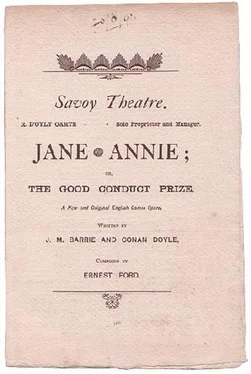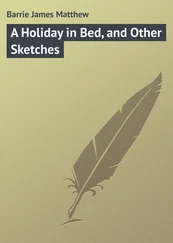James Barrie - Complete Works of J. M. Barrie
Здесь есть возможность читать онлайн «James Barrie - Complete Works of J. M. Barrie» весь текст электронной книги совершенно бесплатно (целиком полную версию без сокращений). В некоторых случаях можно слушать аудио, скачать через торрент в формате fb2 и присутствует краткое содержание. Издательство: Delphi Classics, Жанр: Классическая проза, на английском языке. Описание произведения, (предисловие) а так же отзывы посетителей доступны на портале библиотеки ЛибКат.
- Название:Complete Works of J. M. Barrie
- Автор:
- Издательство:Delphi Classics
- Жанр:
- Год:неизвестен
- ISBN:нет данных
- Рейтинг книги:3 / 5. Голосов: 1
-
Избранное:Добавить в избранное
- Отзывы:
-
Ваша оценка:
- 60
- 1
- 2
- 3
- 4
- 5
Complete Works of J. M. Barrie: краткое содержание, описание и аннотация
Предлагаем к чтению аннотацию, описание, краткое содержание или предисловие (зависит от того, что написал сам автор книги «Complete Works of J. M. Barrie»). Если вы не нашли необходимую информацию о книге — напишите в комментариях, мы постараемся отыскать её.
Peter Pan
Llewelyn Davies boys
Kensington Gardens
Neverland The Little White Bird Peter Pan, or The Boy Who Wouldn't Grow Up Peter Pan
Complete Works of J. M. Barrie — читать онлайн бесплатно полную книгу (весь текст) целиком
Ниже представлен текст книги, разбитый по страницам. Система сохранения места последней прочитанной страницы, позволяет с удобством читать онлайн бесплатно книгу «Complete Works of J. M. Barrie», без необходимости каждый раз заново искать на чём Вы остановились. Поставьте закладку, и сможете в любой момент перейти на страницу, на которой закончили чтение.
Интервал:
Закладка:
Signed before witnesses .”
Never, despite this effort of Mr. Anon’s, can there have been any one more unlike a clubman than I. I daresay I am the only member of clubs who need not take his warning to heart. I ‘belong’ nowadays to at least half a dozen of the stately edifices, but I enter none oftener than, say, quinquennially, and the others less frequently. A canine member is not needed to keep me out but to draw me in.
I have no ill-will to clubs; indeed I am still sometimes caught momentarily in the webs they weave across Pall Mall; a club hair touches my face as I am passing, just sufficient to remind me that I am a member here; I ascend the steps, then I remember and hasten away. What I remember is that I could never find out what one does in clubs; I know about hanging up my hat; then you sit down on a chair and cross your legs, but what does one do after he has crossed his legs? Anon went to London thinking that clubs were Romance, wondering if ever the glorious day would come when callers at his ‘chambers,’ on finding he was out, would know that therefore he must be at ‘the club.’ He even saw, did Anon (in his mind’s eye, O Thackeray), ladies inquiring for him first at those chambers and next with certainty at that club. So he was ripe for Bohemia; clubs even gave him a thrill (which he was never to get from them again) when he joined his first, the Savage. I remember his elation. A kindly acquaintance, already a member thereof, made the terrific announcement that he believed he could get Anon in. He took the trembling one to the headquarters of the club in Adelphi Terrace, put him into a room on the ground floor with padded seats (which made Anon to glow, they were so obviously the real thing), asked him to look more clubable, and then left him alone for a long time, occasionally sending down various friends to look him over and see if he would do. I often pass that way nowadays, being resident in the Latin Quarter, and seem to see Anon on one of the padded seats with his legs crossed while he tries to look clubable. He little thought, poor soul, that he already knew nearly all he and I were ever to know about what one does in clubs.
I have no intention of recounting my various clubs, but the next was the Reform, out of which, so far as frequenting it was concerned, I was driven by Henry James. I liked him well, but I had discovered another thing you can do in clubs, you can get your hair cut there. I naturally clung to that, but, alas, James, who was a true frequenter, clung to it also, and when one is swaddled in that white cloth one wants no friendly neighbour. At such times he and I conversed amiably from our chairs with raging breasts. Then one day I was in Manchester or Liverpool in a big hotel, and it came to me that now was my chance to get my hair cut in peace. I went downstairs, and just as they enveloped me in the loathly sheet I heard a groan from the adjoining chair and saw that its occupant was Henry James. After a moment, when anything might have happened, we both laughed despairingly, but I think with a plucky sympathy, meaning that fate was too much for us. Later in the day we discussed the matter openly for the first time, but could come to no conclusion for future guidance. Each, however, without making any promise, did something to help. Feeling that I had been driven from society by its greatest ornament I let my hair go its own wild way, and he, though he remained in society, removed his beard, which was what had taken him so often to the salon of the artists. Not that I can claim the beard as a trophy of mine, but he did remove it about that time, and I should have been proud to be the shears, for the result was that at last his full face came into the open, and behold it was fair. One saw at last the lovely smile that had so long lain hidden in the forest.
No man of letters, I suppose, ever had a more disarming smile than his, and smiles, as I have told, are a subject about which I can speak with authority. It was worth losing a train (and sometimes you had to do that) while he rummaged for the right word. During the search the smile was playing about his face, a smile with which he was on such good terms that it was a part of him chuckling at the other parts of him. I remember once meeting him in the street and asking him how he liked a lecture we had both lately attended. I did not specially want to know nor he to tell, and as he sought for the right words it began to rain, and by and by it was raining heavily. In this predicament he signed to a passing growler and we got in and it remained there stationary until he reached the triumphant conclusion, which was that no one could have delivered a lecture with less offence. They certainly were absolutely the right words, but the smile’s enjoyment while he searched for them was what I was watching. It brought one down like Leather-stocking’s Killdeer.
I never was so intimate with any other club as to have my hair cut in it, but in the after-days when I knew for certain that there was no rule compelling you to go to a club though you were a member, I joined a number. The only one I almost go to, however, is still the Savage, where long ago I so knowingly crossed my legs. I am not even a member of it now, but for the last twenty years I have lived in an eyry so near this club that through my windows I can note the Savages going in and out as if I were in a lofty private box. They look so happy and waft such gaiety on stilly Saturday nights that I am sure there is more to it than crossing your legs. They have such a reputation for being Bohemians that never surely could I have the heart to tell them that the real Bohemia begins in Adelphi Terrace after the last of them has departed for the night. Then from my eyry, as the ghosts come out, I look upon the only club whose ways I really know, the club of the Adelphi ghosts.
Very likely the first ghost to emerge is Davy Garrick, so dapper in his knee-breeches. I call to some of them from my perch, but he has never been sufficiently near because he always comes to his home in the Terrace by Adam Street, and I am at the other end. Mrs. Bracegirdle tells me that there is a large room on the first floor of his house, so crammed with the MSS. of plays that you could never get inside if the door did not open outwards. Once, she says, he had a house-cleaning and threw all the MSS. into the river. I ought to explain that after the Savage is locked up for the night there is no Embankment, no gardens, and, as in the old days, the river has drawn very near. The only time she ever saw Garrick in a rage, Mrs. Bracegirdle says, was next day, when kindly wherrymen brought the bundles of MSS. back to him, very wet and muddy.
I see Dr. Johnson and Mr. Boswell come out of Garrick’s house, and the great lexicographer as usual crosses the road to tap the rails and count them. They are not the rails of to-day, but, as old prints show, three times as high. Johnson often gets confused in his counting and has to begin again. Sometimes this irritates me and I open my window and call out ‘179’ or the like, at which he shakes his staff at me and Boswell looks up in amazement at my hardihood. They march away, nearly running into Peter the Great who is gossiping at my corner with Mr. Pepys and one Rousseau. The brothers Adam patrol the Adelphi still in the small hours, ready to hand over to the watch any one who may be presuming to alter their designs, and they would ascend to my eyry to ask who had dared to put it here were it not that they are frightened at the lift. They look with suspicious eye on three revellers, Mr. Micawber, the Fat Boy and Charles Lamb, who have just left Rowlandson’s corner and are disturbing by their shouts another ghost at a window across the way, who is Gibbon, very busy correcting the proof-sheets of the ‘Decline and Fall.’
Lamb has no qualification to be here. He was never, alas, one of ours, but we who live in the Adelphi were so shamed by not being able to claim him that after a meeting (which took place in the eyry) we went to the Temple in a fog and collared his ghost and brought it along. We had to keep him roped at first (and it is not easy to rope a ghost) because he had heard there was a Scotsman among us, and as he has told us he was convinced that no Scot loved him. Oh, Charles Lamb! Now he has stutteringly apologized for what he once wrote on that subject, and of all my visitors he is the most desired. He delights in the novelty of the lift as much as the Adam brothers detest it, and sometimes he thinks he has called on me when really he has only gone up and down many times in the lift. I never knew any one so sympathetic nor with such a gift for ghostly talk; as when he asks me how my William is getting on in Australia with the pretty young wife, and how fares my Dick on whom the kettle fell, and where that rogue Harry is, and was it Bob who ran off with Charlotte or Charlotte with Bob, and about Jane and Emily and all the rest of that large family he has invented for me.
Читать дальшеИнтервал:
Закладка:
Похожие книги на «Complete Works of J. M. Barrie»
Представляем Вашему вниманию похожие книги на «Complete Works of J. M. Barrie» списком для выбора. Мы отобрали схожую по названию и смыслу литературу в надежде предоставить читателям больше вариантов отыскать новые, интересные, ещё непрочитанные произведения.
Обсуждение, отзывы о книге «Complete Works of J. M. Barrie» и просто собственные мнения читателей. Оставьте ваши комментарии, напишите, что Вы думаете о произведении, его смысле или главных героях. Укажите что конкретно понравилось, а что нет, и почему Вы так считаете.












